ECC endorses purchase of $582m capital shares in BRICS’s New Development Bank
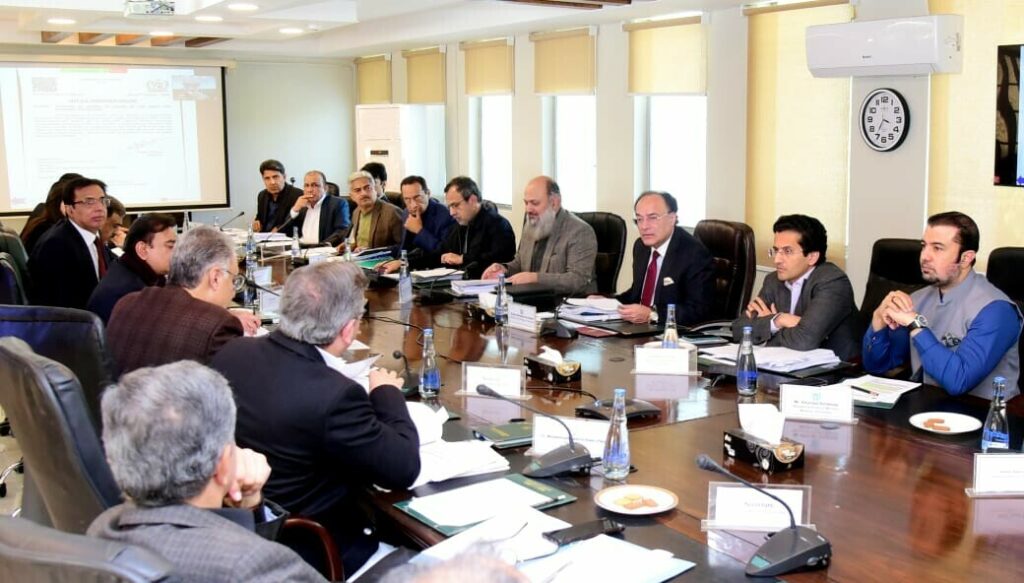
The Economic Coordination Committee (ECC) has given its nod to the purchase of capital shares worth $582 million in the New Development Bank (NDB), according to a Finance Division statement. Established in 2015 by BRICS countries, the NDB is a multilateral development bank aimed at mobilising resources for infrastructure and sustainable development projects in BRICS and other emerging markets and developing countries (EMDCs). “The ECC approved Pakistan’s membership in the New Development Bank, established by BRICS member countries. The committee endorsed the purchase of 5,882 capital shares in the NDB, amounting to USD 582 million, with USD 116 million as paid-in capital,” the statement read on Friday. The countries that comprise BRICS—which stands for Brazil, Russia, India, China, and South Africa, and now five new members—are an informal grouping of emerging economies hoping to increase their sway in the global order. The group was established in 2009. Pakistan is also looking forward to become a part of BRICS. The country applied for the membership of BRICS back in 2023. “We have taken this decision after having noted the BRICS-related developments in Johannesburg,” Pakistan Foreign Office’s spokesperson said then. Meanwhile, US President Donald Trump, after winning 2024 elections, threatened to impose a 100% tariff on the BRICS group nations if they undercut the US dollar. When asked about Trump’s reservations over BRICS, Islamabad said there was no change in Pakistan’s policy to join the BRICS and the country was working with the member countries to become a part of the intergovernmental organisation. In the Friday’s meeting, the ECC also approved a proposal from the Ministry of Commerce regarding the inclusion of PCT/HS codes for newly notified mandatory items of the Pakistan Standards and Quality Control Authority (PSQCA) in the Import Policy Order (IPO), 2022. “The decision incorporates specific PVC and polymer-based products into the mandatory regulatory framework, ensuring compliance with Pakistan Standards,” the Finance Division said. The ECC also deliberated on the transfer of shares of DISCOs in the name of the President of Pakistan as proposed by the Ministry of Energy (Power Division). “The committee approved the transfer with the observation that the approval is subject to confirmation that the transfer will have no financial implications.” The ECC also approved the incorporation of an International Joint Trading Company in Singapore by Pakistan State Oil (PSO) and the State Oil Company of Azerbaijan Republic (SOCAR). The committee instructed the Ministry of Petroleum to ensure due diligence regarding specific investment approvals, particularly equity injections, as well as timeline for operationalisation of the company, according to the Finance Division. ECC approves multiple Technical Supplementary Grants To ensure financial support for key initiatives, the ECC also approved multiple Technical Supplementary Grants (TSGs). It approved Rs19.15 billion under the Finance Division for 133 public sector development programme (PSDP) schemes of the defunct Pakistan Public Works Department (Pak-PWD). “The funds will now be transferred to respective ministries, divisions, and provincial governments.” The ECC also greenlighted Rs5.36 billion for the Ministry of Housing and Works to execute development schemes under the SDGs Achievement Programme (SAP), with Rs4.25 billion allocated for Sindh and Rs1.11 billion for Khyber Pakhtunkhwa. The committee approved Rs1.914 billion ($6.836 million) in favour of the National Database & Registration Authority (NADRA) for the FATA TDP-ERP (KP-CCDSP) Project, ensuring the transition of 43 Citizen Facilitation Centers (CFCs) in Khyber Pakhtunkhwa. “The allocation has been surrendered by the Economic Affairs Division and recorded under the Interior Division with no additional financial burden on the government.” The ECC okayed Rs500 million for the Ministry of National Health Services, Regulations & Coordination (NHSR&C) for the procurement of life-saving medicines and vaccines. The committee directed the Ministry of Health to devise a structural solution for future payment of the subject pension. It approved Rs84 million for the President’s Secretariat (Public) to replace outdated official transport, allowing for the procurement of two Hino Coaster mini-buses and three Toyota Hiace vans as part of a phased replacement plan. The committee also greenlighted a TSG for the Digital Economy Enhancement Project (DEEP) – Component II under the Board of Investment (BoI) to facilitate the establishment of the Pakistan Business Portal (PBP), aimed at streamlining regulations, eliminating redundant laws, and providing a comprehensive digital platform for businesses, according to the Finance Division statement.
Nigeria signs gas pipeline deal with Algeria, Niger Republic

Nigeria has signed a pipeline deal which would transport billions of cubic metres of gas 4,128 kilometres (2,565 miles) from Nigeria in West Africa through Niger and on to Algeria. Officials from the three countries signed the deal in Algiers, Algeria’s capital, aimed at accelerating the development of a vast natural gas pipeline toward Europe on Friday. The Trans-Saharan Gas Pipeline (TSGP) deal would also see the gas pumped through the undersea Mediterranean pipeline, Transmed to Italy, or loaded onto liquefied natural gas tankers for export. The contracts centred on “an update of the feasibility study” and other issues, including non-disclosure agreements among their state energy companies. The feasibility update will lay out the “required means for accelerating the development of this major project in a timely manner and at competitive costs,” Algerian Energy Minister Mohamed Arkab said. While no update was given for the pipeline’s cost, which was estimated at launch at $10 billion, the project has been given new urgency by a surge in gas demand worldwide and soaring prices sparked by Russia’s invasion of Ukraine in February 2022.
Latest Israeli hostages to be exchanged for 369 Palestinian prisoners named
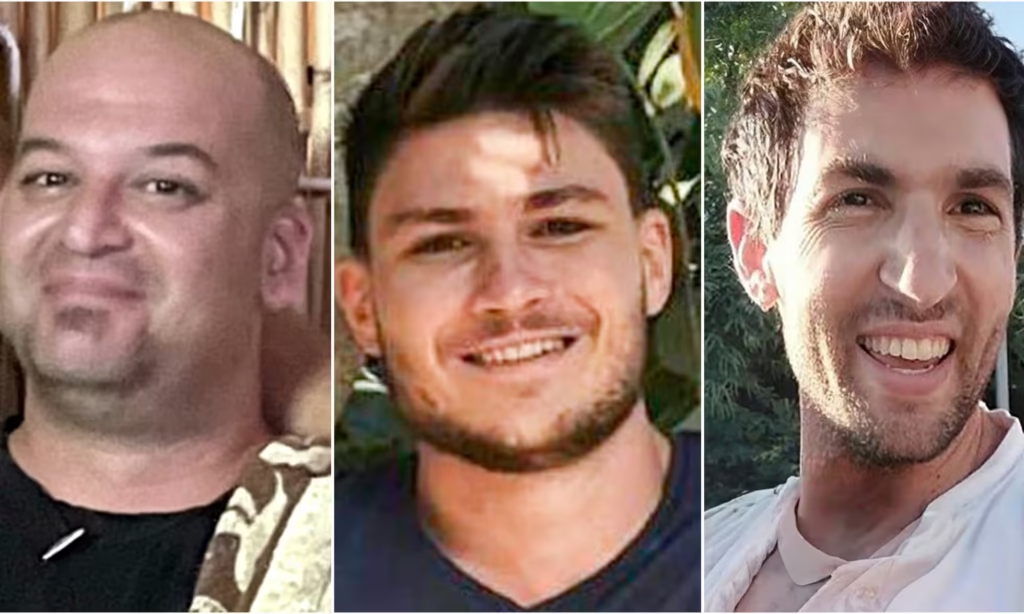
Palestinian militant groups have named the three hostages they plan to free on Saturday in return for the release of 369 Palestinian prisoners held by Israel, raising hopes that the January ceasefire agreement will survive its latest crisis. However, the longer-term prospects of the truce remain in doubt and the uncertainty has been deepened by the US president, Donald Trump, who made surprise territorial claims over Gaza. Saudi Arabia is reportedly planning to host a summit next week to try to agree an alternative plan for Gaza’s future, a week before an emergency Arab League meeting in Cairo to discuss the situation. The hostages due to be released on Saturday have been named as Argentinian-born Iair Horn; a dual US-Israeli citizen, Sagui Dekel-Chen; and a Russian-Israeli, Sasha Troufanov. They were all abducted from the Nir Oz kibbutz, near Gaza, in the Hamas attack of 7 October 2023. Two were held by Hamas and one by Palestinian Islamic Jihad. The identities of the Palestinians due to be freed have not been published, but they are expected to include 333 people taken prisoner in Gaza since the start of the war and 36 inmates serving life prison sentences. Israel and global human rights groups expressed outrage at the frail, emaciated state of the three hostages freed a week ago, their accounts of brutality in captivity, and the handover event staged by Hamas in which the three men had to thank their captors in front of a line of masked, armed gunmen. An Israeli-American hostage released two weeks ago, Keith Siegel, has given a chilling account of his experiences. “I was held for 484 days in unimaginable conditions, every single day felt like it could be my last,” he said in a video message. “I was starved and I was tortured, both physically and emotionally.” The International Committee of the Red Cross (ICRC), which has facilitated the exchanges, said in a statement: “The latest release operations reinforce the urgent need for ICRC access to those held hostage. We remain very concerned about the conditions of the hostages.” It called on Hamas to ensure future handovers were conducted in privacy and with dignity. If Saturday’s hostage release goes ahead, it will bring to 19 the number of Israelis exchanged for about 1,100 Palestinians. Five Thai citizens have also been released. By the end of the first six-week phase, another 14 hostages (six live and the remains of eight who have died in captivity) are due to be freed in exchange for another 800 Palestinian prisoners and detainees. A second phase is due to begin on 1 March, in which both sides plan to release all remaining hostages and prisoners, and Israel would complete its military withdrawal from Gaza. But so far, Benjamin Netanyahu has not empowered his negotiators to start talks on how this second phase would proceed, and Israeli analysts question the prime minister’s readiness to stick to the agreement. “It’s no secret that Netanyahu doesn’t want the deal to continue and wants to stop it before the second phase,” Haaretz’s military analyst, Amos Harel, wrote, adding that if the truce ended, there could be “a year or even longer” of fighting to come. The truce agreement appeared in danger of collapse this week after Hamas announced there would be an indefinite delay to the release of the next three hostages owing to Israel’s alleged violations of the deal. Soon after, Trump suggested that Israel should demand that the remaining hostages be freed by noon on Saturday or “all hell is going to break out”. Israel massed troops around the edge of the Gaza Strip, deepening fears the ceasefire would come to an abrupt end. On Thursday, however, the immediate crisis appeared to recede with Hamas confirming three Israelis would be freed and Netanyahu’s office clarifying that it was not demanding the liberation of all the remaining hostages. However, Trump’s shocking proposal the US would claim possession of Gaza, which would be emptied of its 2.2 million Palestinian inhabitants and developed into a “Riviera” resort coastline, has clouded the prospects for the ceasefire’s survival over the coming weeks. Egypt and Jordan have made it clear to Trump’s administration that they are not prepared to host hundreds of thousands of Palestinians ethnically cleansed from Gaza. The two Arab states, joined by Qatar and the United Arab Emirates, are expected to take part in the Saudi-hosted summit on 20 February, according to sources quoted by Agence France-Presse. The meeting is reportedly intended to hammer out a development plan for Gaza to present as an alternative option to Trump’s proposal.
US deports 119 immigrants of different nationalities to Panama

People from Afghanistan, Iran, China and other countries flown out as Trump’s deportation effort intensifies The US has sent undocumented immigrants from several Asian countries whose governments have refused to accept them to Panama, in a move signalling an intensification of the Trump administration’s deportation effort. A military plane carrying 119 immigrants from countries including Afghanistan, Iran, Uzbekistan, China, Sri Lanka, Turkey and Pakistan flew from California to Panama City on Wednesday in what was expected to be the first of three migrants flights to the country. The revelation that Panama has become a destination for immigrants from countries whose governments have not agreed to take them back follows repeated threats by Donald Trump to seize the Panama canal, whose ownership was handed to the Panamanian government in 1999 under the terms of a treaty signed with the US. The agreement to accept migrants appears to have resulted from a visit to Panama last week by Marco Rubio, the US secretary of state. José Raúl Mulino, Panama’s president, told reporters that the country had received “119 people from diverse nationalities of the world” The immigrants were being accommodated at a local hotel before being transported to a shelter near the Darién Gap, a jungle area in southern Panama, in a process managed by the International Organization for Migration. “We hope to get them out of there as soon as possible,” Mulino said. “This is another contribution Panama is making on the migration issue.” He said the migrants would eventually be transferred to their countries of origin on flights funded by the US. Panama is the latest Central American nation to agree to accept immigrants of other countries expelled from the US after El Salvador and Guatemala offered similar arrangements. CBS reported that a second flight containing Asian and African deportees was scheduled to have left for Panama on Thursday. The network, citing internal government documents, said the flight would include citizens from Cameroon. The Darién Gap, dividing Panama from Colombia, has become a busy transit route for immigrants making their way through Central America en route to the US. In 2023, more than half a million immigrants, mostly from Venezuela, crossed the Darién jungle into Panama. The number reduced to 300,000 last year.
Portable goes gaga over baby mama’s Valentine’s post to boyfriend

Controversial singer, Portable has lashed out at his baby mama, Honey Berry, following her public display of affection with her new boyfriend on Valentine’s Day. It would be recalled that the duo went their separate ways some time ago after a series of public disagreements despite having a child together. In the spirit of Valentine’s Day, Honey Berry shared a romantic video with her new man, captioning it: “My love for you is a journey, starting at forever and ending at never… I love you baby❤️❤️.” The post didn’t sit well with Portable, who is currently running from the Ogun State government. The singer took to the comment section, expressing his frustration in a series of heated remarks. He wrote:“Na trend you wan trend abi you wan die. You dey spoil your son, tomorrow him go swear for you because him papa no do you bad, na you just be aja ADUGBO. God go shame you ALAKADA. Omo oni iya meta, sha bring my son.” Portable further accused Honey Berry of being ungrateful despite his support for her, adding:“All I do for you. I help you when you come to me. Pain full your body as you don lose your helper. Remove my name from your name, you’re nothing. Ajalongbo, house don full 😂�😂😂. You dey my DM dey thank me.”
Mexico threatens to escalate US gunmakers lawsuit with terror charges
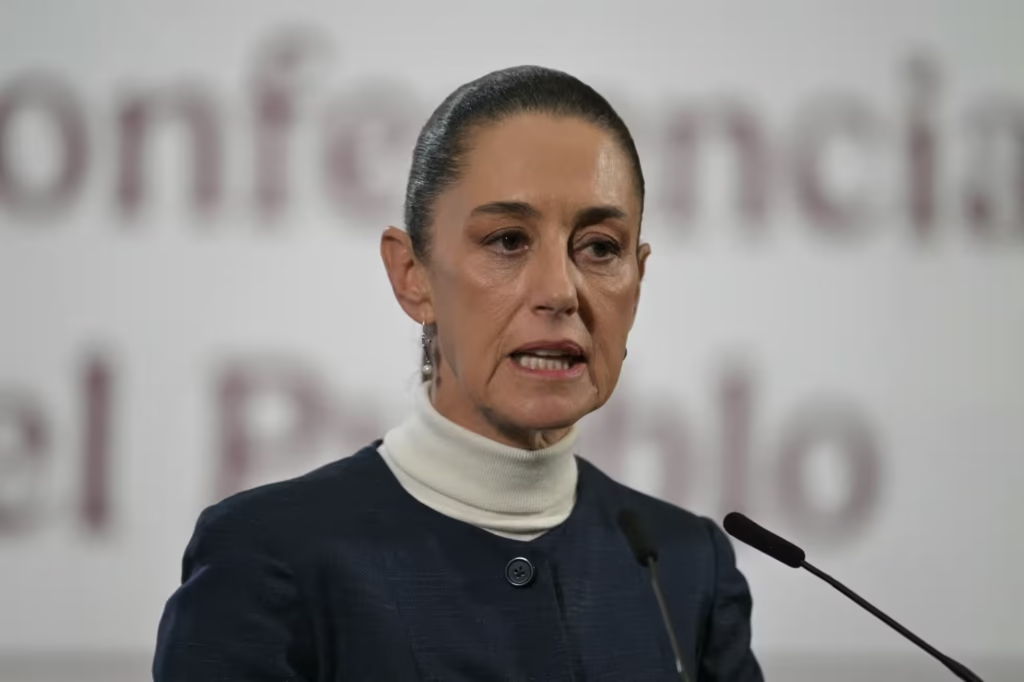
Claudia Scheinbaum warns of reciprocal action if Washington designates country’s cartels as terrorist groups Mexico’s president, Claudia Scheinbaum has warned US gunmakers they could face fresh legal action as accomplices of organized crime if Washington designates the country’s cartels as terrorist groups. The Latin American country, which is under mounting pressure from Donald Trump to curb illegal drug smuggling, wants its neighbor to crack down on firearms trafficking in the other direction. “If they declare these criminal groups as terrorists, then we’ll have to expand our US lawsuit,” Mexico’s president, Claudia Sheinbaum, said at a daily press conference. A new charge could include alleged complicity of gunmakers with terror groups, she said. “The lawyers are looking at it, but they could be accomplices,” Sheinbaum warned. She said the US justice department itself has recognized that “74% of the weapons” used by criminal groups in Mexico come from north of the border. On Thursday, the New York Times reported that the US state department plans to classify criminal groups from Mexico, Colombia, El Salvador and Venezuela as “terrorist organizations.” They include Mexico’s two main drug-trafficking organizations, the Jalisco New Generation and Sinaloa cartels, the report said. Trump signed an executive order on 20 January creating a process for such a designation, saying that the cartels “constitute a national security threat beyond that posed by traditional organized crime.” Mexico says that between 200,000 and 750,000 weapons manufactured by US gunmakers are smuggled across the border from the United States every year, many of which are found at crime scenes. Last August, a US judge dismissed a $10bn lawsuit brought by the Mexican government against six gun manufacturers based in the United States that sought to hold them responsible for deaths from guns trafficked into Mexico. The suit was thrown out based on a lack of jurisdiction, though Mexico said at the time that its lawsuit against two manufacturers, Smith and Wesson and Interstate Arms, would continue. Another suit brought in the border state of Arizona seeks sanctions against dealers that sold guns used in serious crimes over the border. Mexico tightly controls firearm sales, making them practically impossible to obtain legally. Even so, drug-related violence led to the deaths of about 480,000 people in Mexico since the government deployed the army to combat trafficking in 2006, according to official figures. Earlier this month, Sheinbaum angrily rejected an accusation by the United States that her government was allied with drug cartels. “We categorically reject the slander made by the White House against the Mexican government about alliances with criminal organizations,” the president wrote on social platform X at the time. “If there is such an alliance anywhere, it is in the US gun shops that sell high-powered weapons to these criminal groups,” she added. Tensions between the closely connected neighbors soared after the White House said Trump would slap tariffs of 25% on Mexican and Canadian goods because of illegal immigration and drug smuggling. The threatened tariffs have since been halted for 30 days.
Arresting my father would be the biggest mistake, Bashir el-Rufai warns

Bashir el-Rufai, son of former Kaduna State governor, Nasir el-Rufai, has warned the federal government that arresting his father would be their biggest mistake. He gave the warning via a post on social media platform X. His comments have sparked controversy, especially as he appeared to reference President Bola Tinubu by calling him “Pablo Escobar,” a name associated with the infamous Colombian drug lord. The warning comes amid speculation that the federal government, through the office of the National Security Adviser (NSA), Nuhu Ribadu is planning to arrest Nasir el-Rufai. The former governor, who was once a close ally of Tinubu, has been at odds with the administration since his ministerial nomination was rejected by the Senate. Reports have suggested that his growing criticism of the government has put him in the spotlight for possible political retaliation. Reacting to these reports, the youmger el-Rufai took to X to issue a warning, saying, “Na the biggest mistake Pablo Escobar & his henchmen will make.” Although he did not mention President Tinubu by name, many social media users interpreted the statement as a direct attack on the president, given the long-standing controversy surrounding Tinubu’s past involvement in a U.S. narcotics case. In the 1990s, Tinubu was linked to a drug-related case in the United States, which led to the forfeiture of $460,000 to U.S. authorities. His political opponents have often used this case against him, despite his insistence that he was never convicted of any crime.
Sacked Lagos Speaker, Obasa sue Meranda, Lagos Assembly, seeks reinstatement

Former Lagos State House of Assembly Speaker, Mudashiru Obasa has taken his battle for reinstatement to the courts. The Lagos politician has filed a suit at the Lagos State High Court in Ikeja, seeking to be immediately reinstated as the head of the state’s House of Assembly. The suit, filed on February 14, 2025, claims that Obasa was wrongly removed as Lagos Speaker. He has joined the current Speaker, Lasbat Mojisola Meranda, and the Assembly as defendants. This development comes after weeks of failed political meetings aimed at resolving the crisis. The meetings, which were held between Lagos and Abuja, involved politicians loyal to President Bola Tinubu. Despite the President’s alleged call for lawmakers to return Obasa to office, the crisis has lingered. Obasa’s removal as Speaker on January 13, 2025, was a result of allegations of statutory and financial misconduct, including the controversial withdrawal of ₦43.5 billion for backup vehicles for members and other questionable expenditures.
67.3% candidates pass as NECO releases external SSCE results
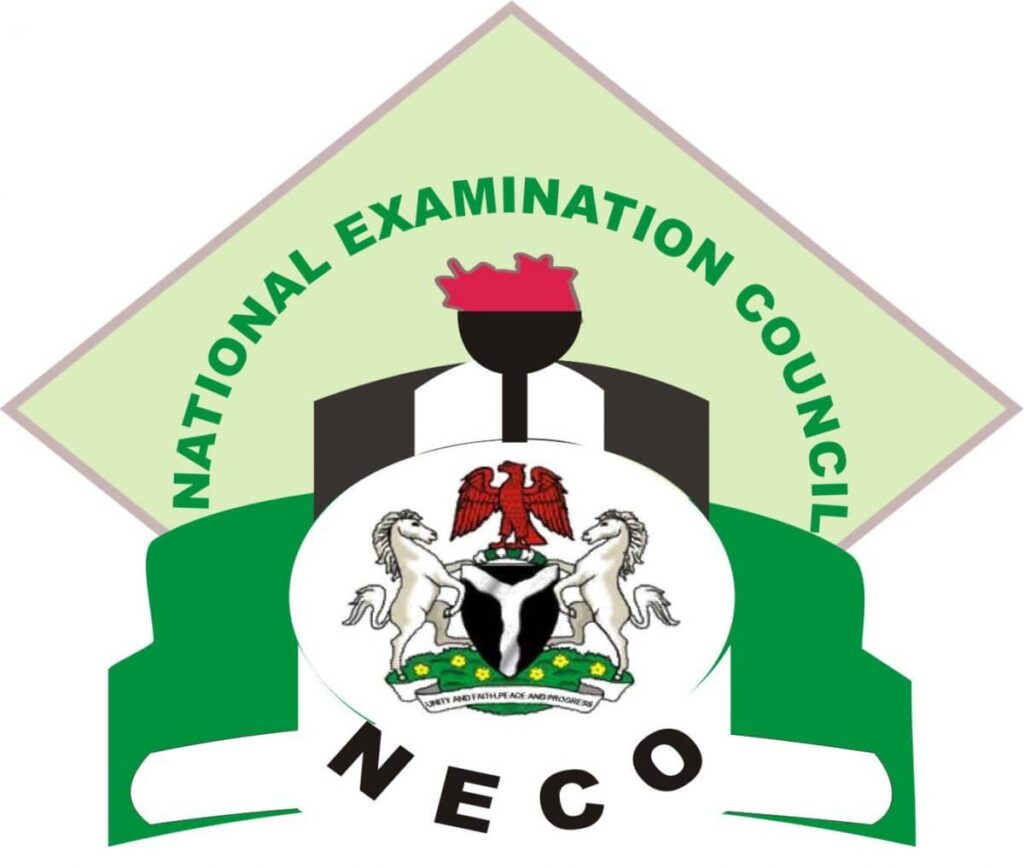
The National Examination Council (NECO) has released the 2024 Senior School Certificate Examination (SSCE) External results of 84,799 candidates of which 57,114 scored five credits and above including English language and Mathematics, representing 67.35 percent. NECO also warned that any supervisor caught involved in exam malpractice will not only be blacklisted, but their names will also be circulated to other exam bodies, including the Joint Admission and Matriculation Board, JAMB. The Registrar and Chief Executive Officer of NECO, Prof Dantani Ibrahim Wushishi, who made this disclosure at organization’s headquarters in Minna, said the total number of candidates comprised 44,227 (52.21℅) male and 40,522 (47.78℅) female. He explained that the result was released 62 days after the last paper of a total of 29 subjects. Wushishi disclosed that a total 6,160 candidates were booked for various forms of malpractice as against 8,518 in 2023, a reduction by 27.7 percent.
Pope Francis cancels events after being admitted to hospital
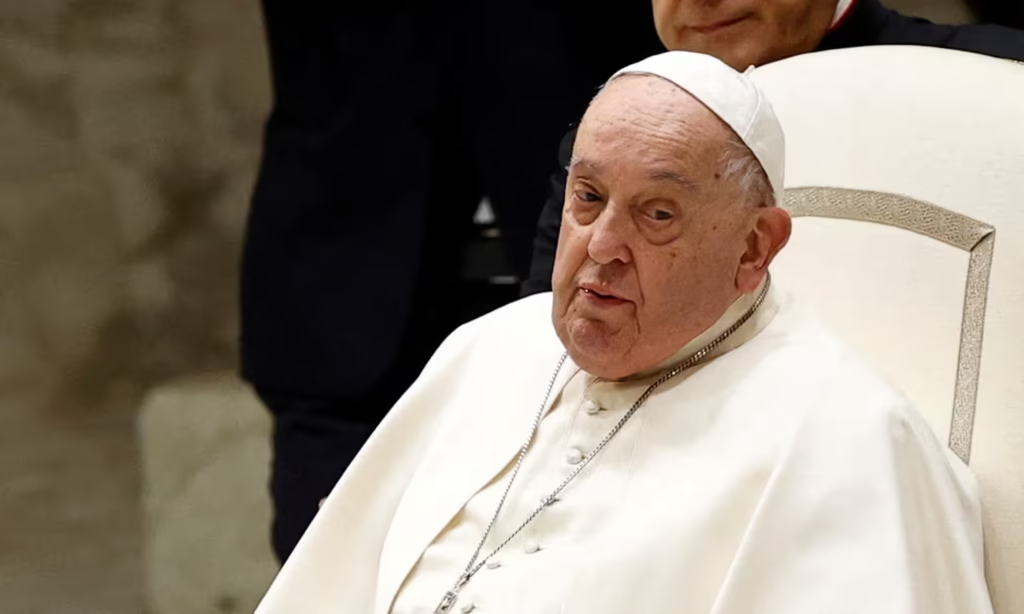
Pope Francis has cancelled his scheduled events over the next few days after being hospitalised, the Vatican said. The pontiff, who has been suffering from bronchitis, was admitted to Gemelli hospital in Rome on Friday after reportedly having breathing difficulties during one of his meetings. In a statement on Friday evening, the Vatican said the pope had been admitted to hospital due to worsening bronchitis and that the first diagnostic tests had shown a “respiratory tract infection”. The pontiff has started “hospital drug therapy”, the statement added, and his “clinical condition is fair; he has a slight fever.” The pontiff’s planned attendance at an audience on Saturday has been cancelled, while mass in Saint Peter’s Basilica on Sunday will instead be delivered by Cardinal José Tolentino de Mendonça. A visit to the Cinecittà film studios on Monday has also been cancelled. Francis, 88, held several meetings on Friday before being taken to hospital, including with Mark Thompson, the CEO of the CNN news channel, which later reported that the pontiff was “mentally alert but struggling to speak for extended periods due to breathing difficulties”. The pope, who has been blighted by ill-health in recent years, was also hospitalised in March 2023 with acute bronchitis. After being discharged, he said: “I am still alive.” He was readmitted to the Gemelli for health checks in June that year and again in February 2024 after suffering from what he said was “a bit of a cold”. Francis had part of his lung removed in his early 20s while training to be a priest in his native Argentina. In June 2021, he underwent a colon operation. He has often been seen in a wheelchair or with a walking stick due to a sciatic nerve pain and a knee problem. In January, he injured his right forearm after falling at his Casa Santa Marta residence and on 1 February he stumbled after his walking stick snapped while entering the Vatican’s auditorium. In early December, Francis hit his chin on his nightstand, reportedly after a fall. Francis, whose schedule has intensified because of this year’s catholic jubilee, has often alluded to resigning if bad health prevents him from doing his job. In 2023, he revealed he had chosen his burial place – the Basilica of Santa Maria Maggiore in the Esquilino neighbourhood of Rome – breaking with the longstanding tradition of popes being buried in the grottos beneath St Peter’s Basilica.



